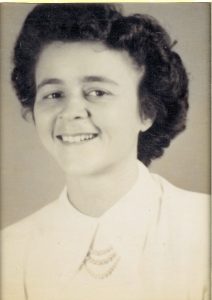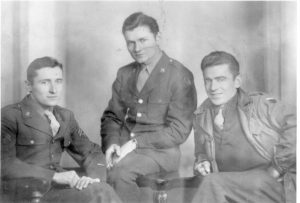When I was a teenager, I’m guessing around 15—which would’ve made it 1972—I was watching TV with my dad. He’d just come home from a company picnic/softball game. And he was buzzed. This was a rarity. In fact, it’s the only time I remember seeing him tipsy. I don’t remember if I saw that as an opportunity or what. But somehow, for the first and only time in my life, he talked to me about his time in the army during WWII. I asked questions, and he answered.

That’s young Esther Knezovich, nee Latini.
He was stationed outside Paris. His title, I would learn from the discharge papers I found only a few months ago, was pharmacist assistant. He was a medic of sorts. He also did a lot of driving. He transported wounded soldiers between facilities. And he transported remains. And then… there were no more questions. Clearly, he’d seen some stuff he’d rather not talk about. And, though I can’t know but I’m pretty sure, he had a kind of survivor’s guilt. Whatever he’d sacrificed and endured, it was nothing compared to those who didn’t come back. It was nothing compared to one of his own brother’s experience, who did come home but not as the same man my dad knew growing up.
Somewhere along my youth I happened upon some of my mother’s photographs. And that’s when I first laid eyes on her first husband. He was tall and blond and handsome. He was an Okie. He was my big sister’s biological father.
My mom was teaching Marines’ kids at Camp Lejeune in North Carolina during the war when the beau of a girlfriend of hers introduced my mom, Esther Latini, to his friend, Belden Anderson. From what I can tell, he swept her off her feet, they married, and he spirited Esther to the glamorous location of Bakersfield, California. I have a hazy memory of asking my mom who this guy in one photograph was. I don’t remember how old I was. I just remember it happened. I asked questions. And I learned that when my sister was six months old, Belden, who worked at an oil refinery, was burned badly over 80 percent of his body as the result of an explosion. I also learned that he lived for nearly three weeks, in agony, more than once begging my mom to end it for him.

That’s my dad Mike on the left. Brother George Knezovich center and Dave Knezovich on the right. Steve Knezovich, not pictured, served in the Navy.
My father was born to immigrants from Serbia. They hadn’t been here 10 years before the Great Depression hit. My mother was born to immigrants from Italy. Ditto. My paternal grandmother had four sons, and at one time they were all serving during WWII. My maternal grandfather worked in a coal mine, survived that work and the violence that flowed from the coal miners’ unionizing. And he had black lung.
And then there’s our friend’s father Joe, an African American man who has a voice that, well, makes you stop and listen. His father grew up in an Alabama town where he, too, worked in a coal mine. The same kind of mine that employed “contract workers” from the county. Back then, the county leased out prisoners to mining companies. Slavery did not end with the Emancipation Proclamation. Joe went on to serve in the war, become a chemist, and helped raise three accomplished women.
So you know, they make me feel like we can get through this. Not without pain. Not without casualties. And I will remain forever angry that there could have been less of both if we’d had any decent leadership.
To that point, my real worry is, will we learn anything? Because I know, I know that Joe, my mom, and my dad did. They understood something about the common good. That if you’re better, I’m better.
Somewhere in my lifetime, we lost that. I hope we manage to get it back. We owe it to Joe and Esther and Mike.
Another important message, and again, so clearly and beautifully said. Thanks for sharing.
Mike- I really enjoyed your post. We need to all be looking after each other. Take care
Excellent ! Thanks!
Thank you for this beautifully written post. Best to you and Beth.
Mike, I think some of us have learned, but some will not. It’s my belief that doctors and scientists, both in China and the rest of the world had their “oh Jesus” moment when they first saw evidence of Covid19. They knew how bad it was. Our child president is already taking credit claiming he realized we were in the middle of Pandemic when in fact he was a denier. His first salvos were only for the purpose of saving precious stock prices. Hopefully, enough will have learned, but I don’t know.
Love this. Wept. Thank you.
I was really mad yesterday when there were so many people out as I walked Henry. It made me nervous that someone might cough at me. Then a friend called and said “I finally get it. I need to stay inside so you don’t get sick and die.” Well, ok. That’s a good way to look at it. Do it for me.
Lovely story. And photos. I do think people will get a better sense of the common good.
I sure hope so.
Leave a Response